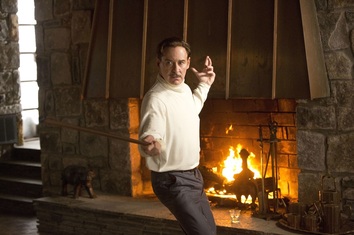Review:
"The Last of Robin Hood"

Release Date: Sept. 5, 2014
Rating: R Running Time: 94 minutes Matinee idol Errol Flynn made no apologies for living every day like it was his last. His insatiable appetite for sex and alcohol often earned him more attention than the roles that made him a Hollywood heartthrob. In 1942, Flynn successfully fought off accusations of statutory rape, but not even his acquittal could repair his damaged career. His Captain Blood and Robin Hood glory days long before him, and in poor health as a result of his hard drinking, Flynn died in 1959 at age 50 of a heart attack. Written and directed by Richard Glatzer and Wash West, The Last of Robin Hood chronicles the last two years of Flynn’s life, when he reportedly engaged in a sexual relationship with underage teenager Beverly Aadland (who died in 2010 at age 67). Early into The Last of Robin Hood, Kevin Kline’s Flynn employs “casting couch” tactics to seduce Dakota Fanning’s aspiring actress. There’s a pained look on Fanning’s fan that suggests Beverly does not welcome the older man’s sexual advances. One apology later, though, and Flynn sweeps her off her feet and introduces her to the glamorous world he has inhabited for decades. Flynn later discovers that Beverly is just 15, but it’s too late: he loves her, needs her, and refuses to let her go. He continues to see Beverly under the watchful eye of her mother, Florence (Susan Sarandon), who quietly approves of this illicit affair because she thinks it will help Beverly’s career. To quote Florence, who would go on to write a book about Beverly and Flynn, The Last of Robin Hood positions itself as an alternative to the “gutter versions” that were written by the press following Flynn about his relationship with Beverly. Glatzer and West look beyond Flynn’s scandal reputation, and his unlawful actions, to present him as a womanizer whose intentions for Beverly are noble and true. The effortlessly suave and sophisticated Kline doesn’t conceal Flynn’s questionable behavior and dubious morals, but he’s so damn charismatic and ingratiating that it’s easy to ignore them when you are in his presence. It’s little wonder that Florence comes across as the villain of The Last of Robin Hood. Sarandon’s stage mom all but pushes her daughter into Flynn’s bed. She doesn’t care about the potential harm it may cause Beverly when the reward for pimping out her daughter could be fame and fortune. Glatzer and West juxtapose Beverly’s relationships with the two adults in her life, and the one she shares with her mother is depicted with some irony as being the most destructive. Florence is a terrible mother, there’s no doubt about, but Sarandon’s willingness to succumb to cartoonish wickedness stands in stark contrast to Kline’s understated portrayal of Flynn. Sarandon deflects attention away from Flynn as Beverly’s true corruptor, almost allowing The Last of Robin Hood to let Flynn off the hook. Fanning offers no hints in The Last of Robin Hood that Beverly’s a gold digger. She portrays Fanning as a loving and devoted companion, one who isn’t star struck or susceptible to manipulation. Needless to say, it’s uncomfortable to watch Flynn and Beverly interact in The Last of Robin Hood, but often for the wrong reason. Glatzer and West wants to depict this taboo relationship with a neutral eye but there are times when The Last of Robin Hood—intentionally or otherwise—gets too close to celebrating a forbidden love. Statutory rape is statutory rape, regardless of the victim’s feelings toward the guilty party, but Glatzer and West know better than to suggest otherwise despite their obvious admiration for Flynn. Robert Sims Aired: Sept. 4, 2014 Web site: http://www.samuelgoldwynfilms.com/ |
|
